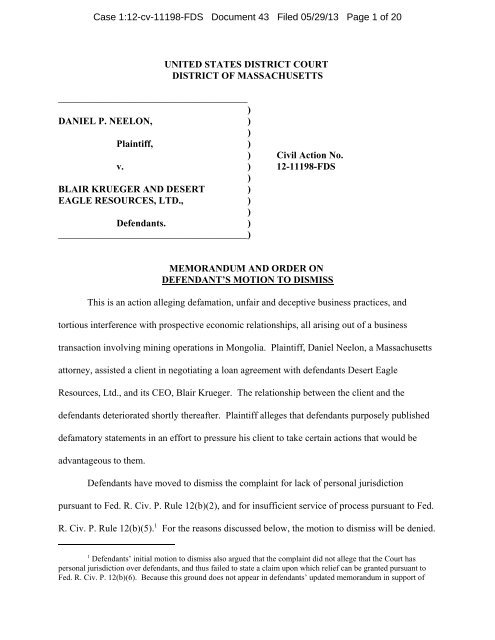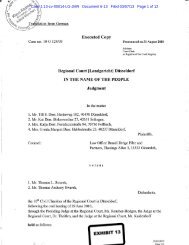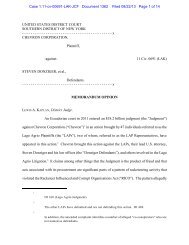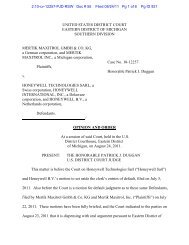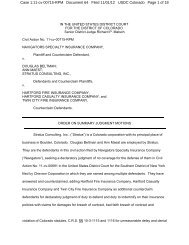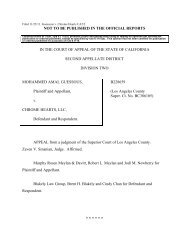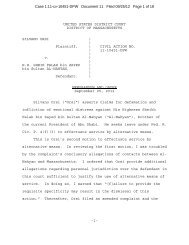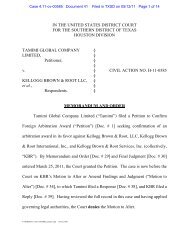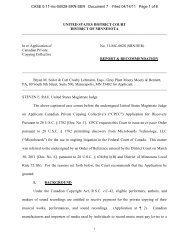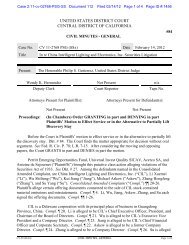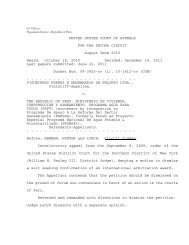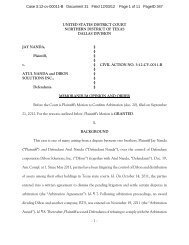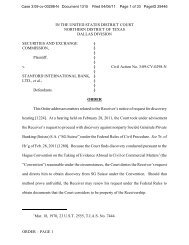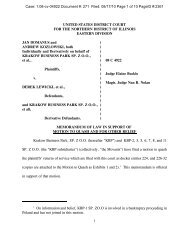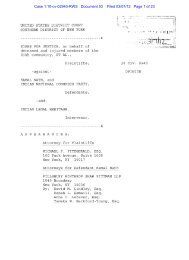DANIEL P. NEELON, Plaintiff, v. B - Letters Blogatory
DANIEL P. NEELON, Plaintiff, v. B - Letters Blogatory
DANIEL P. NEELON, Plaintiff, v. B - Letters Blogatory
Create successful ePaper yourself
Turn your PDF publications into a flip-book with our unique Google optimized e-Paper software.
Case 1:12-cv-11198-FDS Document 43 Filed 05/29/13 Page 1 of 20<br />
UNITED STATES DISTRICT COURT<br />
DISTRICT OF MASSACHUSETTS<br />
_______________________________________<br />
<strong>DANIEL</strong> P. <strong>NEELON</strong>,<br />
)<br />
)<br />
)<br />
<strong>Plaintiff</strong>,<br />
)<br />
) Civil Action No.<br />
v.<br />
)<br />
)<br />
12-11198-FDS<br />
BLAIR KRUEGER AND DESERT )<br />
EAGLE RESOURCES, LTD.,<br />
)<br />
)<br />
Defendants.<br />
)<br />
_______________________________________)<br />
MEMORANDUM AND ORDER ON<br />
DEFENDANT’S MOTION TO DISMISS<br />
This is an action alleging defamation, unfair and deceptive business practices, and<br />
tortious interference with prospective economic relationships, all arising out of a business<br />
transaction involving mining operations in Mongolia. <strong>Plaintiff</strong>, Daniel Neelon, a Massachusetts<br />
attorney, assisted a client in negotiating a loan agreement with defendants Desert Eagle<br />
Resources, Ltd., and its CEO, Blair Krueger. The relationship between the client and the<br />
defendants deteriorated shortly thereafter. <strong>Plaintiff</strong> alleges that defendants purposely published<br />
defamatory statements in an effort to pressure his client to take certain actions that would be<br />
advantageous to them.<br />
Defendants have moved to dismiss the complaint for lack of personal jurisdiction<br />
pursuant to Fed. R. Civ. P. Rule 12(b)(2), and for insufficient service of process pursuant to Fed.<br />
R. Civ. P. Rule 12(b)(5). 1 For the reasons discussed below, the motion to dismiss will be denied.<br />
1 Defendants’ initial motion to dismiss also argued that the complaint did not allege that the Court has<br />
personal jurisdiction over defendants, and thus failed to state a claim upon which relief can be granted pursuant to<br />
Fed. R. Civ. P. 12(b)(6). Because this ground does not appear in defendants’ updated memorandum in support of
Case 1:12-cv-11198-FDS Document 43 Filed 05/29/13 Page 2 of 20<br />
I. Background<br />
A. Factual Background<br />
1. Agreement Between Cohen and Defendants<br />
Daniel Neelon is a licensed attorney in the Commonwealth of Massachusetts. (Compl. <br />
13). In October 2010, he was employed at the Boston-based firm Denner Pellegrino, LLP.<br />
(Compl. 13). At that time, Neelon was involved in negotiating a loan agreement on behalf of<br />
Georges Cohen, a Montreal-based client. (Neelon Dec. 9).<br />
The specifics of the loan agreement are not material to the present case. In short, the<br />
agreement was between Cohen and Garrison Asia, LLC, a Mongolian subsidiary of Garrison<br />
International Ltd., a Toronto-based corporation. 2 The loan transaction was intended to fund<br />
certain interest obligations of Garrison International, as well as to provide capital to Garrison<br />
Asia for mining operations in Mongolia. (Compl. 16). Neelon’s primary negotiating contact<br />
was Blair Krueger, President and CEO of Garrison International and Garrison Asia. (Neelon<br />
Dec. 13-14). Neelon was present in Massachusetts for most of the negotiations; Krueger was<br />
not in Massachusetts at the time, but was aware that Neelon was. (Neelon Dec. 16-17).<br />
The documents prepared in conjunction with the agreement included a note, executed by<br />
officers of Garrison International, that provided an explicit remedy of transfer of 100% of<br />
their motion, and because the amended complaint clearly alleges the existence of personal jurisdiction, the Court will<br />
not consider that ground.<br />
Defendants’ supplemental memorandum sets forth the additional ground that plaintiff failed to oppose the<br />
motion to dismiss for failure to state a claim. <strong>Plaintiff</strong>, however, filed an amended complaint in response to<br />
defendants’ initial motion to dismiss, and has since vigorously opposed defendants’ motion. Accordingly, the Court<br />
will not dismiss the case on that ground.<br />
2 Garrison International now goes by the name Desert Eagle Resources, Ltd., and is a named defendant in<br />
this action.<br />
2
Garrison Asia’s shares to Cohen in the event of any default that lasted at least 72 hours, as well<br />
as a pre-signed share-transfer agreement. (Neelon Dec. 23-24).<br />
Less than two months after the loan documents were executed, Garrison Asia defaulted<br />
on its loan agreement. Acting through local counsel in Mongolia, Cohen exercised his right to<br />
transfer all of the Garrison Asia shares to himself. (Compl. 16).<br />
2. Defendants Alleged Coercive and Defamatory Conduct<br />
The complaint alleges that as a result of the transfer, defendants engaged in a plan to<br />
coerce Cohen to reverse the share transfer. (Compl. 21). Neelon contends that defendants<br />
threatened, harassed, and defamed him in hopes of convincing him to pressure Cohen to return<br />
the shares.<br />
Case 1:12-cv-11198-FDS Document 43 Filed 05/29/13 Page 3 of 20<br />
The complaint alleges that defendants first made veiled threats about “ugly” things that<br />
could happen to Neelon in Mongolia. (Compl. 24). Defendants then filed a complaint against<br />
Neelon and Cohen with the Mongolian Police State Investigation Office. (Compl. 28). The<br />
Mongolian police, however, declined to bring criminal charges. (Compl. 30-32).<br />
On May 20, 2011, defendants issued a press release through Marketwire.com concerning<br />
the share transfer. (Compl. 33). The press release alleged that two men had taken the<br />
company stamp from Garrison Asia’s office in Ulaanbaatar, Mongolia, “without the knowledge<br />
or permission of any of the Officers or Directors of the Company,” and had used it to<br />
fraudulently transfer Garrison Asia’s stock. (Neelon Dec. Ex. 8; Compl. 33). It stated that the<br />
Mongolian police had conducted an investigation, and had recommended that the case proceed to<br />
a criminal trial. It also indicated that “[s]uch trial is pending for those accused of this action.”<br />
(Compl. 34). Defendants also allegedly informed a number of people that Neelon and Cohen<br />
3
Case 1:12-cv-11198-FDS Document 43 Filed 05/29/13 Page 4 of 20<br />
were the two men accused of stealing the stamp. (Compl. 36).<br />
According to the complaint, Neelon and Krueger had a conversation about the allegations<br />
in August 2011, during which Krueger acknowledged that Neelon’s reputation had been harmed<br />
by the press release and statements made by defendants. (Compl. 42). Around the same time,<br />
Krueger sent an e-mail to Jules Brossard, a Quebec-based attorney representing Cohen. (Compl.<br />
43). The subject of the e-mail was “Regarding Daniel Neelon.” (Neelon Dec. Ex. 10).<br />
Krueger stated that he was writing with respect to “concerns regarding the behavior of Mr.<br />
Daniel Neelon, pursuant to the criminal charges which [Cohen] faces in Mongolia.” (Neelon<br />
Dec. Ex. 10). It also included questions that were explicitly “for Mr. Neelon,” as to whether he<br />
was “still practicing law in Mongolia,” and whether he was licensed to practice law in Mongolia.<br />
(Neelon Dec. Ex. 10). After describing Neelon’s involvement in the loan negotiations, Krueger<br />
stated that “[o]ur Counsel has advised us to take up this matter with the Massachusetts Bar<br />
Association.” (Neelon Dec. Ex. 10). 3 He then stated:<br />
It gets worse. I have been provided information that Mr. Neelon has and/or has<br />
attempted to bribe the police in Mongolia to favour the position of your client.<br />
This, of course, is a very serious matter indeed and violates the Foreign Corrupt<br />
Practices Act in the United States of America. Our Counsel has advised us on<br />
this matter and has informed us of the appropriate authorities in the USA with<br />
whom to address this matter.<br />
(Neelon Dec. Ex. 10).<br />
Defendants issued a further press release on September 23, 2011, through<br />
Marketwire.com and news.investors.com. (Compl. 56, 58). The release stated:<br />
The company also wishes to notify its shareholders with an update in regard to its<br />
3 Although it is not clear, defendants may have confused the Massachusetts bar (that is, the entire body of<br />
attorneys licensed to practice in the Commonwealth) or the Massachusetts Board of Bar Overseers (the state attorney<br />
disciplinary authority) with the Massachusetts Bar Association (a private trade organization).<br />
4
News Release of May 20, 2011 concerning its statement of the unauthorized<br />
transfer of the Company’s subsidiary in Mongolia that occurred in January and<br />
February 2011 that a criminal action has been filed in Mongolia against Georges<br />
Cohen, a former director of Garrison International, and Daniel Neelon, Counsel of<br />
Mr. Cohen, and has been assigned case number 21147156. The criminal action<br />
pending against Mr. Cohen and Mr. Neelon was filed under section 236 of the<br />
Mongolian Criminal Code which refers to a procedure which has caused<br />
substantial damage to a business entity and may be reviewed under Section 148<br />
which is entitled “Appropriation of Property by Fraud” or Section 150 which is<br />
entitled “Misappropriation or Embezzlement of Property.”<br />
(Compl. 59). The press release referred to the Mongolian police’s alleged role in taking<br />
possession of assets that were “taken by Cohen and Neelon.” (Neelon Dec. Ex. 9). It referred to<br />
Neelon as an attorney in the United States and a member of the Massachusetts Bar Association.<br />
(Compl. 65).<br />
Case 1:12-cv-11198-FDS Document 43 Filed 05/29/13 Page 5 of 20<br />
The complaint further alleges that defendant Krueger was involved in the preparation of a<br />
blog entry on stockhouse.com entitled “Alleged Criminal Daniel P. Neelon,” which was posted<br />
on September 24, 2011, within twelve hours of the September 23 press release. (Compl. 71).<br />
Finally, the complaint refers to financial statements that Garrison International posted on<br />
sedar.com in October 2011, which also referred to a pending criminal action against Neelon.<br />
(Compl. 76, 77).<br />
The complaint alleges that defendants knew or should have known that several of the<br />
statements contained in their press releases, e-mails, blog posts, and published statements—in<br />
particular, those regarding a criminal action against Neelon—were false. It further alleges that<br />
defendants intended to cause harm to Neelon’s reputation and profession in Massachusetts, and<br />
intended for those reading the release to believe that Neelon had been charged with a crime by a<br />
governmental authority in Mongolia.<br />
5
B. Procedural Background<br />
On July 2, 2012, Daniel Neelon initiated the present action against Blair Krueger and<br />
Desert Eagle Resources, Ltd. The complaint alleges claims of defamation, defamation per se,<br />
violation of Mass. Gen. Laws ch. 93A, and tortious interference with prospective economic<br />
relationships.<br />
Case 1:12-cv-11198-FDS Document 43 Filed 05/29/13 Page 6 of 20<br />
This is the third action that plaintiff has brought against defendants. On August 11, 2011,<br />
plaintiff and Cohen jointly filed suit against defendants and others in Quebec, Canada. In<br />
February 2012, plaintiff voluntarily dismissed his claims; the lawsuit continued as to only<br />
Cohen’s claims. On January 31, 2012, plaintiff filed a similar suit in the United States District<br />
Court for the Central District of California. Following a motion to dismiss for forum non<br />
conveniens, plaintiff dismissed his claims against Krueger and Desert Eagle; claims against the<br />
other defendants were later dismissed.<br />
On December 21, 2012, plaintiff filed an amended complaint. Defendants have now<br />
moved to dismiss that complaint for lack of personal jurisdiction pursuant to Fed. R. Civ. P.<br />
12(b)(2) and insufficient process pursuant to Fed. R. Civ. P. 12(b)(5).<br />
II. Personal Jurisdiction<br />
Defendants have moved to dismiss the complaint on the ground that the Court lacks<br />
personal jurisdiction over them. <strong>Plaintiff</strong> contends that he has sufficiently alleged a basis for<br />
personal jurisdiction based on defendant’s intentional actions directed at Massachusetts.<br />
A. General Principles<br />
The plaintiff bears the burden of showing that a court has personal jurisdiction over a<br />
defendant. Daynard v. Ness, Motley, Loadholt, Richardson & Poole, P.A., 290 F.3d 42, 50 (1st<br />
6
Case 1:12-cv-11198-FDS Document 43 Filed 05/29/13 Page 7 of 20<br />
Cir. 2002). A district court faced with a motion to dismiss under Rule 12(b)(2) may choose<br />
among several methods for determining whether the plaintiff has met its burden: the “prima<br />
facie” standard, the “preponderance-of-the-evidence” standard, or the “likelihood” standard. Id.<br />
at 50-51; Foster-Miller, Inc., v. Babcock & Wilcox Can., 46 F.3d 138, 145-47 (1st Cir. 1995);<br />
Boit v. Gar-Tec Prods., Inc., 967 F.2d 671, 675-78 (1st Cir. 1992).<br />
Where, as here, a district court considers a motion to dismiss for lack of personal<br />
jurisdiction without first holding an evidentiary hearing, the prima facie standard governs its<br />
determination. United States v. Swiss Am. Bank, Ltd., 274 F.3d 610, 618 (1st Cir. 2001). This<br />
standard is the “most conventional” of the methods for determining personal jurisdiction.<br />
Daynard, 290 F.3d at 51 (quoting Foster-Miller, 46 F.3d at 145). In conducting a prima facie<br />
analysis, the court is required to take specific facts affirmatively alleged by the plaintiff as true<br />
(whether or not disputed), construing them in the light most favorable to the plaintiff; the court,<br />
however, should not credit “conclusory allegations or draw farfetched inferences.”<br />
Ticketmaster-New York v. Alioto, 26 F.3d 201, 203 (1st Cir. 1994). The court can “add to the<br />
mix [any] facts put forward by the defendants, to the extent that they are uncontradicted.”<br />
Daynard, 290 F.3d at 51. Although the court will construe the facts in the light most favorable<br />
to the plaintiff in a motion to dismiss, the plaintiff still has the burden of demonstrating each<br />
jurisdictional requirement. See Swiss Am. Bank, 274 F.3d at 618.<br />
The exercise of personal jurisdiction over a defendant must be both authorized by statute<br />
and consistent with the due process requirements of the United States Constitution. See, e.g.,<br />
Nowak v. Tak How Invs., Ltd., 94 F.3d 708, 712 (1st Cir. 1996); Intech, Inc., v. Triple “C”<br />
Marine Salvage, Inc., 444 Mass. 122, 125 (2005); Good Hope Indus., Inc. v. Ryder Scott, Co.,<br />
7
Case 1:12-cv-11198-FDS Document 43 Filed 05/29/13 Page 8 of 20<br />
378 Mass. 1, 5-6 (1979). Furthermore,<br />
A district court may exercise authority over a defendant by virtue of either<br />
general or specific jurisdiction. Specific jurisdiction exists when there is a<br />
demonstrable nexus between a plaintiff’s claims and a defendant’s forum-based<br />
activities. General jurisdiction exists when the litigation is not directly founded<br />
on the defendant’s forum-based contacts, but the defendant has nevertheless<br />
engaged in continuous and systematic activity, unrelated to the suit, in the forum<br />
state.<br />
Swiss Am. Bank, 274 F.3d at 618 (citations and quotations omitted).<br />
Although the complaint does not specifically allege whether this Court’s jurisdiction over<br />
the defendant is specific, general, or both, plaintiff’s briefing makes clear that he is advancing a<br />
theory of specific jurisdiction.<br />
B. Specific Jurisdiction<br />
In Massachusetts, a federal court can assert specific personal jurisdiction over an out-of-<br />
state defendant in a diversity case only if the Massachusetts long-arm statute so allows and the<br />
exercise of jurisdiction is consistent with the due process requirements of the United States<br />
Constitution. U.S.S. Yachts, Inc. v. Ocean Yachts, Inc., 894 F. 2d 9, 11 (1st Cir. 1990). The<br />
Massachusetts Supreme Judicial Court has consistently interpreted the long-arm statute to extend<br />
to the limits allowed by the United States Constitution. See “Automatic” Sprinkler Corp. of Am.<br />
v. Seneca Foods Corp., 361 Mass. 441, 443 (1972); accord Tatro v. Manor Care, Inc., 416 Mass.<br />
763, 771 (1994). Thus, the First Circuit has held that a district court “may sidestep the [long-arm<br />
statute] inquiry and proceed directly to the constitutional analysis.” Evans Cabinet Corp. v.<br />
Kitchen Int’l, Inc., 593 F. 3d 135, 146 (1st Cir. 2010).<br />
This Court may exercise personal jurisdiction consistent with the Due Process clause<br />
only if it finds that defendant has maintained “minimum contacts” with the state “such that<br />
8
maintenance of the suit does not offend traditional notions of fair play and substantial justice.”<br />
International Shoe Co. v. Washington, 326 U.S. 310, 316 (1945).<br />
The minimum-contacts analysis has three steps—relatedness, purposeful availment, and<br />
reasonableness:<br />
First, the claim underlying the litigation must directly arise out of, or relate to, the<br />
defendant’s forum-state activities. Second, the defendant’s in-state contacts must<br />
represent a purposeful availment of the privilege of conducting activities in the<br />
forum state, thereby invoking the benefits and protections of that state’s laws and<br />
making the defendant’s involuntary presence before the state’s courts foreseeable.<br />
Third, the exercise of jurisdiction must, in light of the Gestalt factors, be<br />
reasonable.<br />
Adelson v. Hananel, 510 F.3d 43, 49 (1st Cir. 2007) (citing Daynard, 290 F.3d at 60). The<br />
“gestalt” factors address the fairness of subjecting the defendant to the court’s jurisdiction by<br />
analyzing:<br />
Case 1:12-cv-11198-FDS Document 43 Filed 05/29/13 Page 9 of 20<br />
(1) the defendant’s burden of appearing in the forum;<br />
(2) the forum state’s interest in adjudicating th[e] dispute;<br />
(3) the plaintiff’s interest in obtaining convenient and effective relief;<br />
(4) the judicial system’s interest in obtaining the most effective resolution to th[e]<br />
controversy; and<br />
(5) the common interest of all sovereigns in promoting substantive due process.<br />
Evans Cabinet Corp., 593 F.3d at 146.<br />
1. Relatedness<br />
The “relatedness” inquiry for tort claims focuses on whether the defendant’s in-forum<br />
conduct caused the injury or gave rise to the cause of action. Swiss Am. Bank, 274 F.3d at 622.<br />
Here, plaintiff contends that he has suffered injuries to his professional reputation and standing<br />
as an attorney in Massachusetts as a result of defendant’s publication of defamatory information<br />
in press releases, e-mails, and other publications.<br />
<strong>Plaintiff</strong> has clearly alleged that his claims arise out of defendant’s conduct, and thus has<br />
9
Case 1:12-cv-11198-FDS Document 43 Filed 05/29/13 Page 10 of 20<br />
satisfied the “relatedness” requirement. To the extent that defendants contest that any of their<br />
conduct can properly be characterized as “in-forum,” that argument is better addressed in the<br />
second part of the minimum contacts analysis, the “purposeful availment” requirement.<br />
2. Purposeful Availment<br />
In the context of a defamation suit, the First Circuit has indicated that “[t]he decisive due<br />
process issue . . . is whether the defendants’ activities satisfy the purposeful availment<br />
requirement.” Noonan v. Winston Co., 135 F.3d 85, 90 (1st Cir. 1998). In answering this<br />
question, courts are guided by the reasoning set forth by the Supreme Court in Calder v. Jones,<br />
465 U.S. 783 (1984). In Calder, the Supreme Court addressed a case involving two Florida<br />
reporters who wrote a libelous article about a California entertainer for publication in a national<br />
tabloid. The Supreme Court held that California courts could properly exercise jurisdiction over<br />
the nonresident defendants because<br />
(i) their intentional actions were aimed at the forum State, (ii) they knew that the<br />
article was likely to have a devastating impact on the plaintiff, and (iii) they knew<br />
that the brunt of the injury would be felt by the plaintiff in the forum State where<br />
she lived, worked, and the article would have the largest circulation.<br />
Hugel v. McNell, 886 F.2d 1, 4 (1st Cir. 1989) (citing Calder, 465 U.S. at 789-90).<br />
Since Calder, courts have recognized the complicated and fact-intensive nature of the<br />
“purposeful availment” inquiry, and have struggled to define the circumstances under which they<br />
may properly exercise jurisdiction over out-of-forum defendants. It is clear that the existence of<br />
injurious effects in the forum state is not, without more, sufficient to sustain jurisdiction. Rather,<br />
in the context of defamation, the focus of the “purposeful availment” inquiry is whether it “can<br />
be fairly inferred that [defendants] intended the brunt of the injury to be felt” in the forum state.<br />
Hugel, 886 F.2d at 5.<br />
10
Case 1:12-cv-11198-FDS Document 43 Filed 05/29/13 Page 11 of 20<br />
Here, plaintiff focuses on two actions by the defendants that he alleges were “aimed” at<br />
Massachusetts, and were intended to injure plaintiff in Massachusetts. First, plaintiff points to<br />
Krueger’s August 9, 2011 e-mail to Jules Grossard as an act of “purposeful availment.” That<br />
e-mail was sent from Krueger’s office in Toronto to Grossard in Quebec. (Krueger Decl. 24).<br />
In the e-mail, Krueger indicated his intention to report plaintiff’s allegedly unlicensed practice of<br />
law in Mongolia to the “Massachusetts Bar Association”; he also alleged that plaintiff had<br />
violated the federal Foreign Corrupt Practices Act, and implied that he intended to contact “the<br />
appropriate authorities in the USA.”<br />
Second, plaintiff points to defendants’ press release of September 23, 2011. That release<br />
was published through two services: Marketwire.com, a press release distribution service with<br />
international readership and offices in Toronto, Boston, and Los Angeles, (Neelon Dec. 40,<br />
43); and news.investors.com, a website that is part of Investors Business Daily, Inc. (Compl. <br />
58). The press release identified plaintiff by name as an attorney and a “member of the<br />
Massachusetts Bar Association,” and referred repeatedly to a pending criminal action against<br />
him in Mongolia.<br />
The issue is whether defendants’ conduct was expressly aimed at Massachusetts.<br />
Defendants do not dispute that they made public reference to plaintiff’s Massachusetts bar<br />
license in an article discussing criminal charges that were allegedly pending against him in<br />
Mongolia. However, they contend that the article was published in Canada, and did not target<br />
Massachusetts in any way.<br />
While the article was sent from Toronto, it was published on a press release distribution<br />
service and a business investor publication’s website, both of which could be accessed globally.<br />
11
Case 1:12-cv-11198-FDS Document 43 Filed 05/29/13 Page 12 of 20<br />
Further, unlike defendants’ May 20, 2011 press release, the publication does not merely refer to<br />
“two men” when it alleges criminal activity. Defendants’ decision to identify plaintiff as a<br />
Massachusetts attorney certainly gives rise to a fair inference that defendants knew or should<br />
have known that the allegations would have a negative impact on plaintiff’s reputation and<br />
business prospects—harm that would be felt principally in Massachusetts. It also supports a<br />
reasonable inference that defendants intended this effect.<br />
That inference is further supported by Krueger’s e-mail indicating his intent to contact<br />
authorities in the United States—and specifically in Massachusetts—about plaintiff’s conduct.<br />
While the act of contacting the Board of Bar Overseers cannot itself give rise to civil liability,<br />
referring to possible complaints to the Board and other authorities in communications with third<br />
parties is not similarly protected. Taking these statements in the light most favorable to the<br />
plaintiff, they can fairly be inferred as demonstrating an intent to impugn plaintiff’s reputation<br />
and career prospects in Massachusetts, where plaintiff had an established law practice.<br />
A finding of personal jurisdiction in this case is also supported by the First Circuit’s<br />
analysis in Hugel v. McNell, 886 F.2d 1 (1st Cir. 1989). In Hugel, defendants met with two<br />
Washington Post reporters. Allegedly, they advised the reporters that Hugel—a New Hampshire<br />
resident and the Deputy Direction of Administration for the CIA at the time—was engaging in<br />
illegal securities transactions. The Washington Post printed a front-page article based on<br />
defendants’ allegations, and Hugel was forced to resign his position at the CIA. Although the<br />
statements were published in a national newspaper, and did not single out New Hampshire, the<br />
First Circuit found that the plaintiff had sufficiently alleged that the defendants “actually directed<br />
their actions at a New Hampshire resident.” Hugel, 886 F.2d at 5. The court reasoned that:<br />
12
[Defendants] knew that release of the allegedly false information would have a<br />
devastating impact on Hugel, and it can be fairly inferred that they intended the<br />
brunt of the injury to be felt in New Hampshire where Hugel had an established<br />
reputation as a businessman and public servant . . . The intended result of the<br />
[defendants’] contact with the reporters and release of information to them,<br />
according to the complaint, was to impugn Hugel’s honesty, integrity, and his<br />
ability to perform duties as either a public official or businessman.<br />
Id. Here, the same intended result can be inferred from defendants’ publication of a press release<br />
referring to a pending criminal case against a licensed Massachusetts attorney. 4<br />
When construed in the light most favorable to the plaintiff, the facts as pleaded are<br />
sufficient to support the allegation that defendants intended for their actions to cause injury to<br />
plaintiff in Massachusetts. Accordingly, plaintiff has sustained his burden of demonstrating the<br />
“purposeful availment” requirement.<br />
3. Reasonableness<br />
Even if plaintiff has demonstrated that both the “relatedness” and “purposeful availment”<br />
requirements have been met, the court’s exercise of jurisdiction must also “comport with fair<br />
play and substantial justice.” U.S.S. Yachts, 894 F.2d at 11. The Supreme Court has identified<br />
five “gestalt factors” that bear upon the fairness of subjecting nonresidents to this Court’s<br />
jurisdiction. Sawtelle v. Farrell, 70 F.3d 1381, 1394 (1st Cir. 1995). These factors are as<br />
follows:<br />
Case 1:12-cv-11198-FDS Document 43 Filed 05/29/13 Page 13 of 20<br />
(1) the defendant’s burden of appearing in the forum;<br />
4 The Court is not persuaded that the reasoning of Broadvoice, Inc. v. TP Innovations, 733 F. Supp. 2d 219,<br />
224 (D. Mass. 2010) requires a different result. That case addressed the question of whether a defendant’s<br />
interactive website that was neither commercial in nature, nor directed specifically to a Massachusetts audience,<br />
could satisfy the purposeful availment test. Id. at 224-25. The publication in that action was limited to the<br />
defendant’s own website. Here, while defendants did post the press releases on their website, they also distributed<br />
the press releases to a worldwide audience through third-party websites, including a paid marketing service. That<br />
additional step evinces an intent to reach a broader audience than just individuals visiting defendants’ own site. The<br />
First Circuit has indicated that “widespread circulation of a publication indicates deliberate action.” Noonan, 135<br />
F.3d at 91.<br />
13
Case 1:12-cv-11198-FDS Document 43 Filed 05/29/13 Page 14 of 20<br />
(2) the forum state’s interest in adjudicating th[e] dispute;<br />
(3) the plaintiff’s interest in obtaining convenient and effective relief;<br />
(4) the judicial system’s interest in obtaining the most effective resolution to th[e]<br />
controversy; and<br />
(5) the common interest of all sovereigns in promoting substantive due process.<br />
Evans Cabinet Corp., 593 F.3d at 146.<br />
a. Defendant’s Burden<br />
Defending in a foreign jurisdiction almost always presents some measure of<br />
inconvenience. Thus, the First Circuit has required a defendant seeking relief from a court’s<br />
exercise of jurisdiction based on this factor to demonstrate “a special or unusual burden.”<br />
Sawtelle, 70 F.3d at 1395. Here, defendants claim no such burden, and the Court notes that<br />
Massachusetts is not an especially burdensome location for litigation for Toronto-based<br />
defendants. The Court concludes that this factor is essentially neutral.<br />
b. Forum State’s Interest<br />
The First Circuit has indicated that “[t]he purpose of [this] inquiry is not to compare the<br />
forum’s interest to that of some other jurisdiction, but to determine the extent to which the forum<br />
has an interest.” Foster-Miller, 46 F.3d at 151.<br />
Here, a Massachusetts resident and attorney alleges that he has been the victim of<br />
defamation and other intentional torts that have caused him injury within the Commonwealth. A<br />
state “generally has a manifest interest in providing its resident with a convenient forum for<br />
redressing injuries inflicted by out of state actors. Burger King Corp. v. Rudzewicz, 471 U.S.<br />
463, 573 (1985). Thus, Massachusetts has a clear interest in the outcome of this dispute. This<br />
factor cuts in favor of a finding of personal jurisdiction.<br />
14
Case 1:12-cv-11198-FDS Document 43 Filed 05/29/13 Page 15 of 20<br />
c. <strong>Plaintiff</strong>’s Interest in Convenient Relief<br />
It is well-settled that “a plaintiff’s choice of forum must be accorded a degree of<br />
deference with respect to the issue of its own convenience.” Sawtelle, 70 F.3d at 1395. It is<br />
unquestionably more convenient for plaintiff, a Massachusetts resident, to litigate his claims in<br />
his home state. This factor cuts in favor of a finding of personal jurisdiction.<br />
d. Judicial System’s Interest in Effective Resolution<br />
<strong>Plaintiff</strong> asserts that the “potentially crushing financial burden” that he would face if he<br />
were to pursue this action in Canada indicates that Massachusetts is the best forum for effective<br />
resolution of his claim. He also contends that any court hearing the action would apply<br />
Massachusetts law, as the injury occurred in the Commonwealth.<br />
Defendants have not countered either of these arguments. Thus, this factor appears to cut<br />
in favor of a finding of personal jurisdiction.<br />
e. Common Interest of All Sovereigns<br />
The final factor is the common interest of all sovereigns in promoting substantive social<br />
policies. Sawtelle, 70 F.3d at 1395. This factor does not cut strongly in either direction. The<br />
First Circuit has previously recognized the ability of a state to provide a convenient forum for its<br />
residents as a prominent policy factor to be considered. Id. The Court views this factor as either<br />
neutral or cutting slightly in favor of a finding of personal jurisdiction over the defendants.<br />
In summary, the “gestalt factors” cut in favor of the exercise of this Court’s jurisdiction.<br />
4. Conclusion<br />
Because all three elements of the First Circuit’s minimum contacts analysis are satisfied,<br />
defendants’ motion to dismiss for lack of personal jurisdiction pursuant to Fed. R. Civ. P.<br />
15
Case 1:12-cv-11198-FDS Document 43 Filed 05/29/13 Page 16 of 20<br />
12(b)(2) will be denied.<br />
III. Service of Process<br />
Defendants have also moved to dismiss for insufficient service of process. They contend<br />
that neither Krueger nor Desert Eagle were properly served with the original complaint within<br />
120 days of filing, as required by Fed. R. Civ. P. 4(m).<br />
A. General Principles<br />
When the sufficiency of service of process is challenged under Fed. R. Civ. P. 12(b)(5),<br />
plaintiff bears the burden of proving proper service. Lopez v. Municipality of Dorado, 979 F.2d<br />
885, 887 (1st Cir. 1992).<br />
Rule 4 sets forth the acceptable methods by which service of process can be effected.<br />
Fed. R. Civ. P. 4. Under Rule 4(f), an individual in a foreign country may be served by an<br />
internationally accepted means of service that is reasonably calculated to give notice. 5 Under<br />
Rule 4(h)(2), a corporation, partnership, or association that is served in a foreign country may be<br />
served “in any manner prescribed by Rule 4(f) for serving an individual, except personal<br />
delivery under (f)(2)(C)(i).”<br />
5 Rule 4(f) provides that an individual may be served:<br />
(1) by any internationally agreed means of service that is reasonably calculated to give notice, such as those<br />
authorized by the Hague Convention on the Service Abroad of Judicial and Extrajudicial Documents;<br />
(2) if there is no internationally agreed means, or if an international agreement allows but does not specify other<br />
means, by a method that is reasonably calculated to give notice:<br />
(A) as prescribed by the foreign country’s law for service in that country in an action in its courts of general<br />
jurisdiction;<br />
(B) as the foreign authority directs in response to a letter rogatory or letter of request; or<br />
(C) unless prohibited by the foreign country’s law, by:<br />
(i) delivering a copy of the summons and of the complaint to the individual personally; or<br />
(ii) using any form of mail that the clerk addresses and sends to the individual and that requires a signed receipt;<br />
or<br />
(3) by other means not prohibited by international agreement, as the court orders.<br />
16
Case 1:12-cv-11198-FDS Document 43 Filed 05/29/13 Page 17 of 20<br />
Generally, service of process must occur within 120 days after the complaint is filed.<br />
Fed. R. Civ. P. 4(m). The rule provides that:<br />
[i]f a defendant is not served within 120 days after the complaint is filed, the<br />
court—on motion or on its own after notice to the plaintiff—must dismiss the<br />
action without prejudice . . . But if the plaintiff shows good cause for the failure,<br />
the court must extend the time for service for an appropriate period.<br />
Fed. R. Civ. P. 4(m).<br />
<strong>Plaintiff</strong> filed suit on July 2, 2012. <strong>Plaintiff</strong>’s counsel then retained Select Document<br />
Services—a Toronto-based company that serves court documents in Canada—to serve process<br />
on defendants. (Spencer Aff. 3-4). On July 17, 2012, Christian Spencer, a manager at the<br />
company, attempted to serve process on defendants at the Toronto offices of Desert Eagle<br />
Resources. Spencer identified himself and his purpose, and was met by a woman named Bulgan<br />
Orgilsaikhan, who stated that she was authorized to accept service on behalf of Desert Eagle<br />
Resources. (Spencer Aff. 7). <strong>Plaintiff</strong> was unaware that defendants believed this service to be<br />
insufficient until defendants filed their motion to dismiss. Spencer was unable to serve process<br />
on Krueger at the time, as he was not present at the office.<br />
On September 5, 2012, another process server attempted service on Krueger at his home<br />
address. (Spencer Aff. 8). A woman who identified herself as Krueger’s wife answered the<br />
door. She indicated that she was aware of the lawsuit, but that her husband was unavailable and<br />
would be leaving the country later that day. (Spencer Aff. 8). Process servers returned to the<br />
house to attempt process later the same evening, and again on October 10 and October 16, but no<br />
one answered the door. (Spencer Aff. 9).<br />
On November 30, 2012, defendants moved to dismiss for, among other things,<br />
insufficient service of process. Three weeks later, on December 21, plaintiff filed an amended<br />
17
complaint. Defendants do not contest that they have been properly served with the amended<br />
complaint.<br />
As soon as plaintiff filed his amended complaint, that document became the operative<br />
pleading. Because the original complaint is no longer operative, defendants’ motion to dismiss<br />
that complaint for insufficient service of process is moot.<br />
In any event, even if defendants’ motion were not moot, it would be denied. The motion<br />
is based on Fed. R. Civ. P. 4(m), which provides that a plaintiff has 120 days from the date a<br />
complaint is filed to serve process on all defendants. By its terms, the rule states that it “does not<br />
apply to service in a foreign country pursuant to subdivision (f) or (j)(1).” Fed. R. Civ. P. 4(m).<br />
Rule 4(f) governs service of individuals in foreign countries. Courts have interpreted this rule,<br />
consistent with its plain meaning, as removing any deadline for serving a complaint on an<br />
individual in a foreign country. Lucas v. Natoli, 936 F.2d 432, 433 (9th Cir.); Pennsylvania<br />
Orthopedic Ass’n v. Mercedes-Benz A.G., 160 F.R.D. 58 (E.D. Pa. 1995). Thus, plaintiff was not<br />
bound to serve Krueger within the 120-day time period.<br />
As to Desert Eagle, Rule 4(m) states that the court must extend the time for service where<br />
a plaintiff can show good cause for a failure to serve process. <strong>Plaintiff</strong>’s process server made<br />
timely service upon Ms. Orgilsaikhan, an employee at Desert Eagle’s offices, who represented<br />
that she was authorized to accept service on Desert Eagle’s behalf. Defendants did not inform<br />
plaintiff that this service was deficient until approximately 150 days after the complaint was<br />
filed. <strong>Plaintiff</strong> thus had good cause for the alleged failure to serve.<br />
denied.<br />
Case 1:12-cv-11198-FDS Document 43 Filed 05/29/13 Page 18 of 20<br />
Accordingly, defendant’s motion to dismiss for insufficient service of process will be<br />
18
Case 1:12-cv-11198-FDS Document 43 Filed 05/29/13 Page 19 of 20<br />
IV. Defendant’s Motion to Strike<br />
Defendants have moved to strike Neelon’s Declaration in Support of the Surreply. In the<br />
affidavit, plaintiff asserts that a bank employee told him that the bank denied him a loan in part<br />
because of defendants’ press release of September 23, 2011. They contend that the statements<br />
are hearsay, and should therefore be struck from the record.<br />
Defendants do not cite to any case for the proposition that a Court must, when<br />
considering a motion to dismiss for lack of personal jurisdiction, strike any affidavit that is based<br />
on hearsay. While a motion to strike is the proper vehicle for challenging the admissibility of an<br />
affidavit offered at summary judgment, Casa Office Machs., Inc. v. Mita Copystar Am., Inc., 42<br />
F.3d 668, 682 (1st Cir. 1994), defendants cite no authority for the proposition that hearsay<br />
affidavits cannot be considered for the purpose of determining personal jurisdiction.<br />
The law appears to be unsettled. At least some courts have held that hearsay statements<br />
may be considered for purposes of determining personal jurisdiction. See, e.g., Campbell Pet<br />
Co. v. Miale, 542 F.3d 879, 888-89 (Fed. Cir. 2008); see also IHFC Props., LLC v. APA Mktg.,<br />
850 F. Supp. 2d 604, 620 n.10 (M.D.N.C. 2012). Other courts have suggested that such<br />
statements may not be considered. See United Techs. Corp. v. Mazer, 556 F.3d 1260, 1278 (11th<br />
Cir. 2009). This Court need not, however, decide this issue. Whether defendants are correct<br />
or not, Neelon’s Declaration in Support of the Surreply played no role in this Court’s resolution<br />
of the jurisdictional issue. Accordingly, the motion to strike will be denied as moot.<br />
V. Conclusion<br />
For the foregoing reasons, defendants’ motion to dismiss is DENIED, and defendants’ motion to<br />
strike is DENIED as moot.<br />
19
So Ordered.<br />
Case 1:12-cv-11198-FDS Document 43 Filed 05/29/13 Page 20 of 20<br />
/s/ F. Dennis Saylor<br />
F. Dennis Saylor IV<br />
Dated: May 29, 2013 United States District Judge<br />
20


